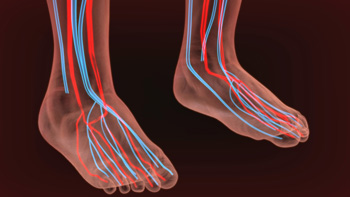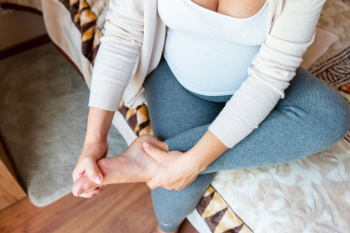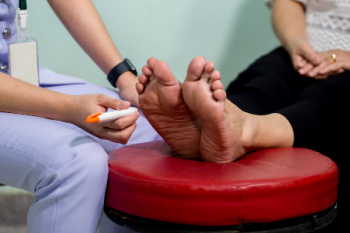Items filtered by date: June 2025
Recognizing Poor Circulation in the Feet

Poor circulation in the feet occurs when blood flow is reduced, often due to underlying conditions like diabetes, peripheral artery disease, or Raynaud's phenomenon. which causes blood vessels to narrow in response to cold or stress, and leads to pale, cold, or numb toes that may later turn blue or red. Symptoms of poor circulation include tingling, cramping, slow-healing wounds, and noticeable temperature differences between feet. These signs should not be ignored, as they may indicate more serious vascular issues. A podiatrist can perform diagnostic tests, recommend lifestyle changes, and provide treatment options to improve blood flow and manage discomfort. If you are experiencing any signs of poor circulation in your feet, it is suggested that you schedule an appointment with a podiatrist who can help you to manage your foot health.
Poor circulation is a serious condition and needs immediate medical attention. If you have any concerns with poor circulation in your feet contact one of our podiatrists of Metro Foot & Ankle. Our doctors will treat your foot and ankle needs.
Poor Circulation in the Feet
Poor blood circulation in the feet and legs is can be caused by peripheral artery disease (PAD), which is the result of a buildup of plaque in the arteries.
Plaque buildup or atherosclerosis results from excess calcium and cholesterol in the bloodstream. This can restrict the amount of blood which can flow through the arteries. Poor blood circulation in the feet and legs are sometimes caused by inflammation in the blood vessels, known as vasculitis.
Causes
Lack of oxygen and oxygen from poor blood circulation restricts muscle growth and development. It can also cause:
- Muscle pain, stiffness, or weakness
- Numbness or cramping in the legs
- Skin discoloration
- Slower nail & hair growth
- Erectile dysfunction
Those who have diabetes or smoke are at greatest risk for poor circulation, as are those who are over 50. If you have poor circulation in the feet and legs it may be caused by PAD and is important to make changes to your lifestyle in order to reduce risk of getting a heart attack or stroke. Exercise and maintaining a healthy lifestyle will dramatically improve conditions.
As always, see a podiatrist as he or she will assist in finding a regimen that suits you. A podiatrist can also prescribe you any needed medication.
If you have any questions, please feel free to contact our office located in Tempe, AZ . We offer the newest diagnostic and treatment technologies for all your foot care needs.
Common Foot Conditions Caused by Pregnancy

Pregnancy can bring several changes to the feet due to weight gain, hormonal shifts, and fluid retention. Flat feet may develop as the arches collapse from added pressure and increased ligament laxity. Swelling in the feet and ankles is also common as circulation changes. Ingrown toenails can result from wearing tight shoes and altered foot shape. Cracked heels may appear due to dry skin and increased strain. These issues can cause discomfort and affect mobility. A podiatrist can provide personalized care through proper footwear guidance, safe treatments, and prevention strategies. If you are experiencing foot problems during pregnancy, it is suggested that you schedule a visit with this type of doctor for effective relief and support during this important time.
Pregnant women with swollen feet can be treated with a variety of different methods that are readily available. For more information about other cures for swollen feet during pregnancy, consult with one of our podiatrists from Metro Foot & Ankle. Our doctors will attend to all of your foot and ankle needs.
What Foot Problems Can Arise During Pregnancy?
One problem that can occur is overpronation, which occurs when the arch of the foot flattens and tends to roll inward. This can cause pain and discomfort in your heels while you’re walking or even just standing up, trying to support your baby.
Another problem is edema, or swelling in the extremities. This often affects the feet during pregnancy but tends to occur in the later stages.
How Can I Keep My Feet Healthy During Pregnancy?
- Wearing orthotics can provide extra support for the feet and help distribute weight evenly
- Minimize the amount of time spent walking barefoot
- Wear shoes with good arch support
- Wear shoes that allow for good circulation to the feet
- Elevate feet if you experience swelling
- Massage your feet
- Get regular, light exercise, such as walking, to promote blood circulation to the feet
If you have any questions, please feel free to contact our office located in Tempe, AZ . We offer the newest diagnostic and treatment technologies for all your foot care needs.
Understanding Foot Neuropathy

Foot neuropathy is a condition that results from damage to the peripheral nerves in the lower extremities, leading to symptoms such as burning, tingling, numbness, or sharp pain in the feet. It can be caused by diabetes, alcohol abuse, infections, trauma, or exposure to certain toxins. Risk factors include poor blood sugar control, vitamin deficiencies, and underlying medical conditions, such as kidney disease or autoimmune disorders. The symptoms often begin gradually and may affect balance or increase the risk of falls and injury. A podiatrist plays an essential role in diagnosing the condition through physical exams and nerve testing. If you have symptoms of foot neuropathy, it is suggested that you consult a podiatrist. This type of doctor offers treatment plans that may include medication, lifestyle guidance, footwear recommendations, and regular monitoring to help reduce symptoms and prevent further nerve damage.
Neuropathy
Neuropathy can be a potentially serious condition, especially if it is left undiagnosed. If you have any concerns that you may be experiencing nerve loss in your feet, consult with one of our podiatrists from Metro Foot & Ankle. Our doctors will assess your condition and provide you with quality foot and ankle treatment for neuropathy.
What Is Neuropathy?
Neuropathy is a condition that leads to damage to the nerves in the body. Peripheral neuropathy, or neuropathy that affects your peripheral nervous system, usually occurs in the feet. Neuropathy can be triggered by a number of different causes. Such causes include diabetes, infections, cancers, disorders, and toxic substances.
Symptoms of Neuropathy Include:
- Numbness
- Sensation loss
- Prickling and tingling sensations
- Throbbing, freezing, burning pains
- Muscle weakness
Those with diabetes are at serious risk due to being unable to feel an ulcer on their feet. Diabetics usually also suffer from poor blood circulation. This can lead to the wound not healing, infections occurring, and the limb may have to be amputated.
Treatment
To treat neuropathy in the foot, podiatrists will first diagnose the cause of the neuropathy. Figuring out the underlying cause of the neuropathy will allow the podiatrist to prescribe the best treatment, whether it be caused by diabetes, toxic substance exposure, infection, etc. If the nerve has not died, then it’s possible that sensation may be able to return to the foot.
Pain medication may be issued for pain. Electrical nerve stimulation can be used to stimulate nerves. If the neuropathy is caused from pressure on the nerves, then surgery may be necessary.
If you have any questions, please feel free to contact our office located in Tempe, AZ . We offer the newest diagnostic and treatment technologies for all your foot care needs.

